- Timeline of Significant Events (1905-1917)
- Explanation of Significant Events
- The Russian Revolution Factions: Bolsheviks
- The Russian Revolution Factions: Mensheviks
- Domestic and Foreign Opposition to Revolution
- The Evaluation of the Seizure of Power by Bolsheviks
- Conclusion: Changes that Occurred in Society
- Bibliography
Timeline of Significant Events (1905-1917)
- January 22, 1905: Bloody Sunday; Czar Nicholas’s troops open fire on working-class demonstrators in Petrograd.
- October 1905: Czar Nicholas II proclaims the Russian Parliament (Duma) by the October Manifesto.
- August 1, 1914: Russian troops are mobilized on the Eastern Front by Czar Nicholas II for war with Germany.
- March 1917: Soldiers revolt, and food riots start in the cities; a new Provisional government is created.
- March 15, 1917: the abdication of Czar Nicholas II; Russia becomes a republic.
- November 7, 1917: control over Petrograd is seized by Bolsheviks.
- November 8, 1917: Bolsheviks take the place of the Russian Provincial Government.
The timeline of significant events starts with the Bloody Sunday in 1905 and ends with Bolsheviks’ control of the country.
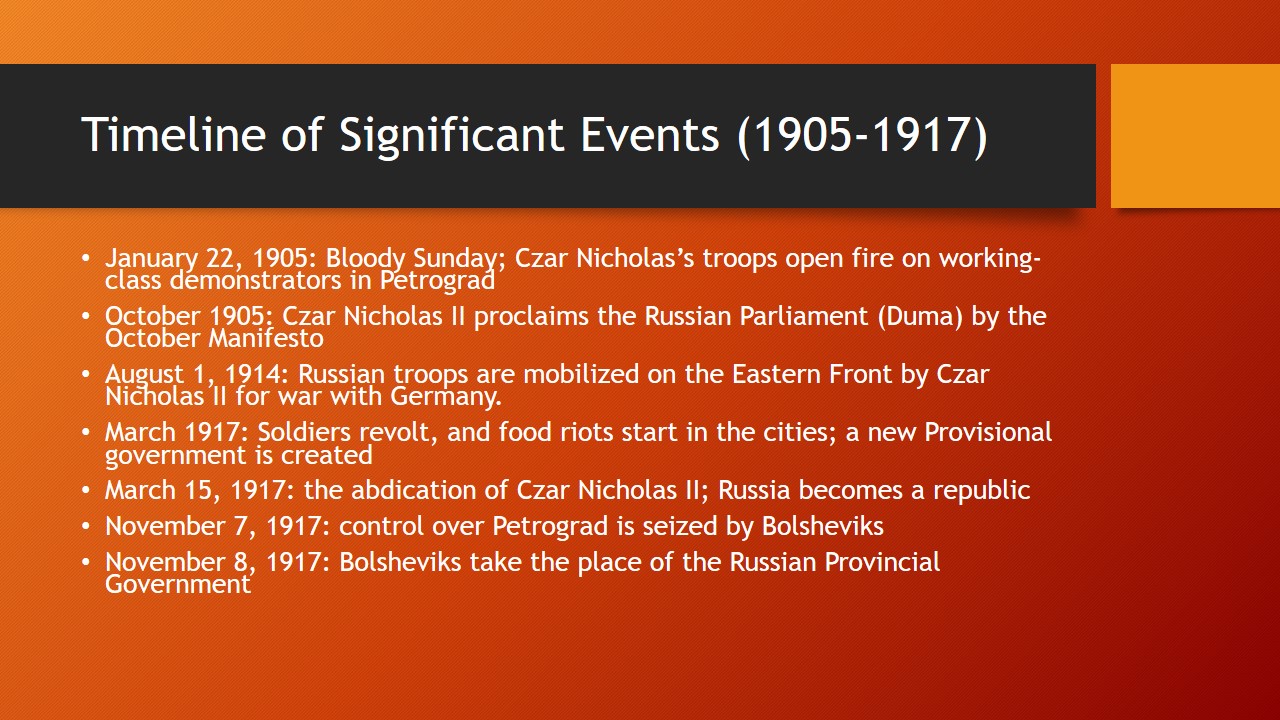
Explanation of Significant Events
- Bloody Sunday: the massacre against workers who came to the Winter Palace in a peaceful demonstration.
- The number of people: 50,000 to 60,000.
- The workers considered themselves to be loyal subjects.
- They tried to express legitimate complaints.
- The czar was not in the palace; he gave the order to meet the marchers with gunfire.
- If workers had been accepted well, it could have been possible to avoid bloodshed.
- 1914: Germany declared war on Russia, and the czar mobilized troops.
- Russia entered the war as the ally of France and England.
- Unpreparedness to protect the borders and poor equipment of soldiers.
- Numerous deaths and lost lands led to riots.
- 1917: a citywide strike in Petrograd.
- The czar ordered soldiers to dismiss the strikers, but soldiers refused to do so.
- 1917: Bolsheviks seized major government buildings.
The initial event that finally led to the revolution was the Bloody Sunday – the day that received its name from the events happening in January 1905. On that day, tens of thousands of workers marched to the Winter Palace in Petrograd with the intention to tell the czar how dissatisfied they were with the conditions of work and payment. However, what was hoped to be a peaceful conversation turned out to be a massacre. Not only was the czar absent from the palace but he also gave a command to meet those who came with gunfire. As a result of such treatment, major tensions among the working- and middle-class people started. It is believed that if the czar at least had talked to the people, even if not promising anything to them, it would have been possible to avoid the events that unfolded after the Bloody Sunday.
In nearly ten years following the Bloody Sunday, the czar of Russia tried to keep order and remain at rule. However, due to a serious of riots and people’s dissatisfaction of the tactics pursued by the government, revolutionaries under the guidance of Lenin managed to seize power.
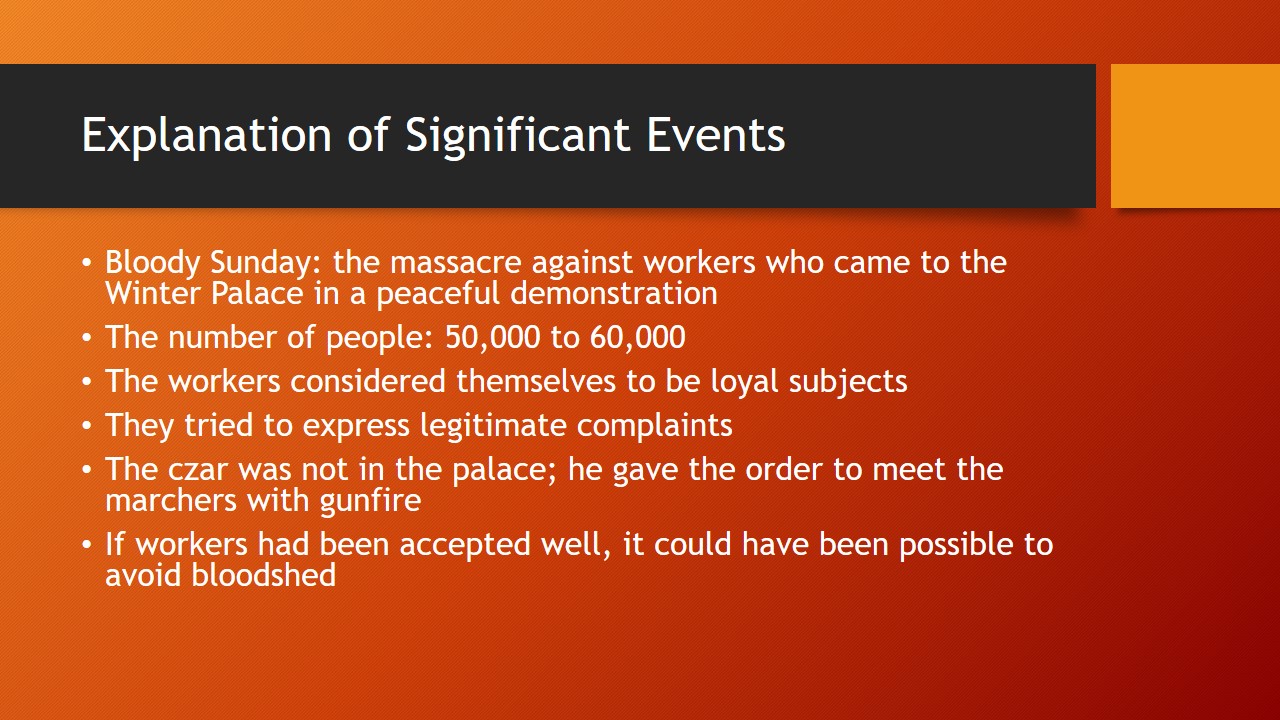
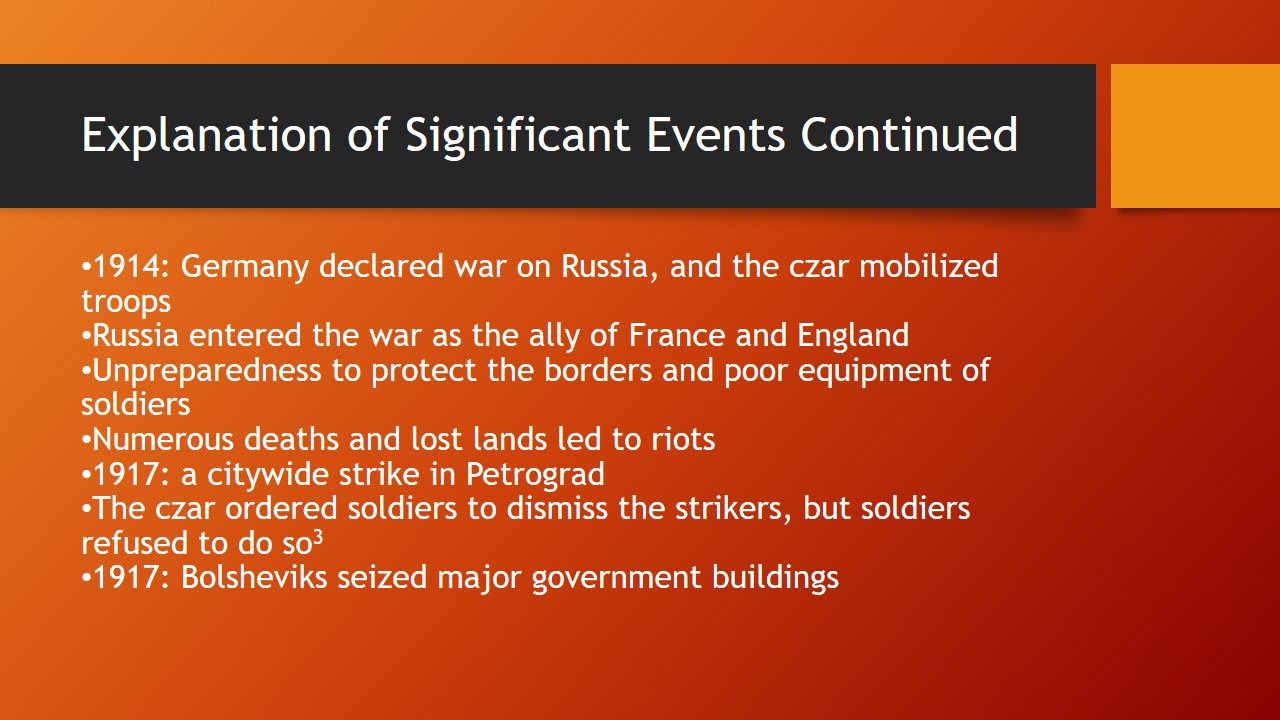
The Russian Revolution Factions: Bolsheviks
- The leader: Vladimir Lenin.
- Leon Trotsky: started as a Menshevik but then joined Bolsheviks and became another leader.
- Lenin’s beliefs: a small revolutionary party under tight control could lead the proletarian forces.
- Lenin’s goals: gaining a broad social change in the country and seizing the power.
- Lenin’s promise: the new government would be “of the people, by the people, and for the people.”
Bolsheviks constituted the largest radical group in revolutionary Russia that played the most important role in the initiation and the course of the revolution. The leader of the group, Lenin, proclaimed equal rights to all citizens and eventually initiated the formation of the communist party. Despite being the major power during the revolution, Bolsheviks lacked experience and a clear vision. As a result, the governance of Bolsheviks was based on the idea of denying “the precious fruit of the Western political thought,” which ended in negative outcomes for the people and the country.
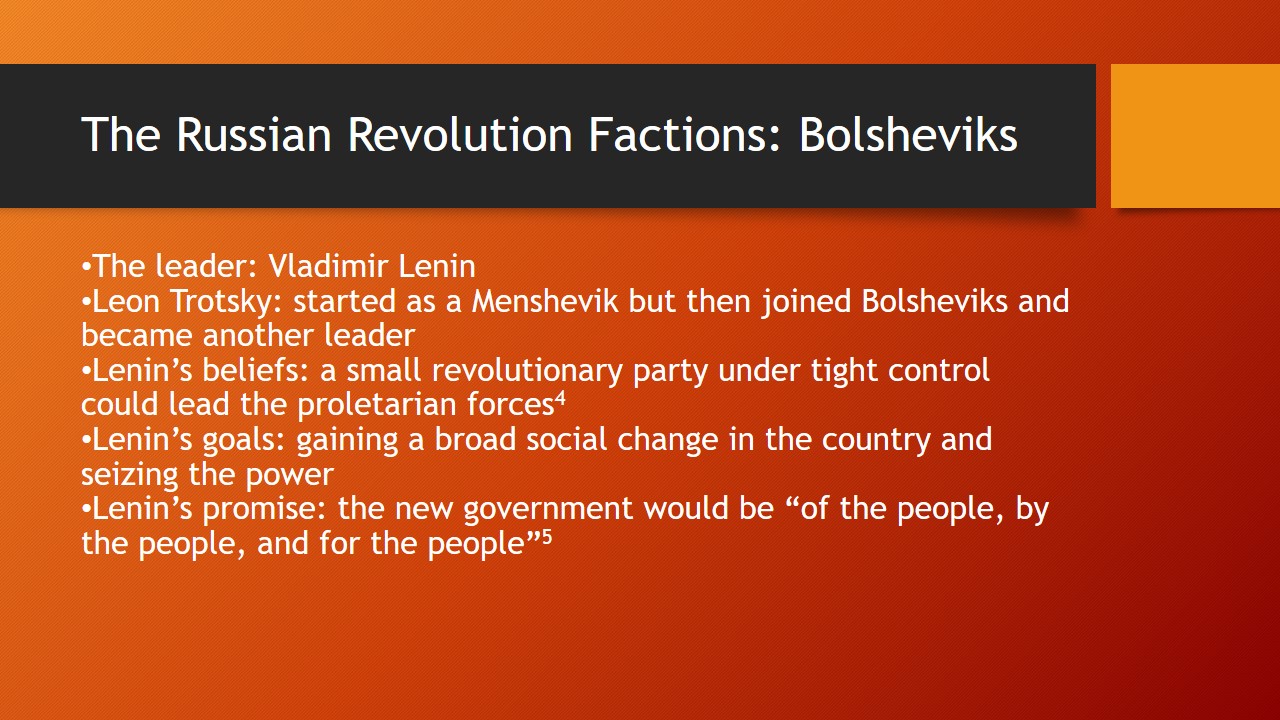
The Russian Revolution Factions: Mensheviks
- Leaders: Martov, Plekhanov, Axelrod.
- Mensheviks’ vision: the revolution should be postponed until the Russian working class became larger and stronger.
- Plekhanov: considered that it was not possible to accomplish a bourgeois revolution without the bourgeoisie.
- Mensheviks delayed the arming of the workers because they did not want to argue with the bourgeoisie.
- The role of Mensheviks: they undermined Bolsheviks’ ideas.
- Mensheviks sought help from the Entente.
Mensheviks, as well as Bolsheviks, were dissatisfied with the czar’s regime. However, Mensheviks were not as optimistic about the prospects or arranging a revolution as Lenin’s supporters. Specifically, Martov and other leaders of Mensheviks noted that the working class needed more political awareness and had to increase in size before pursuing significant goals.
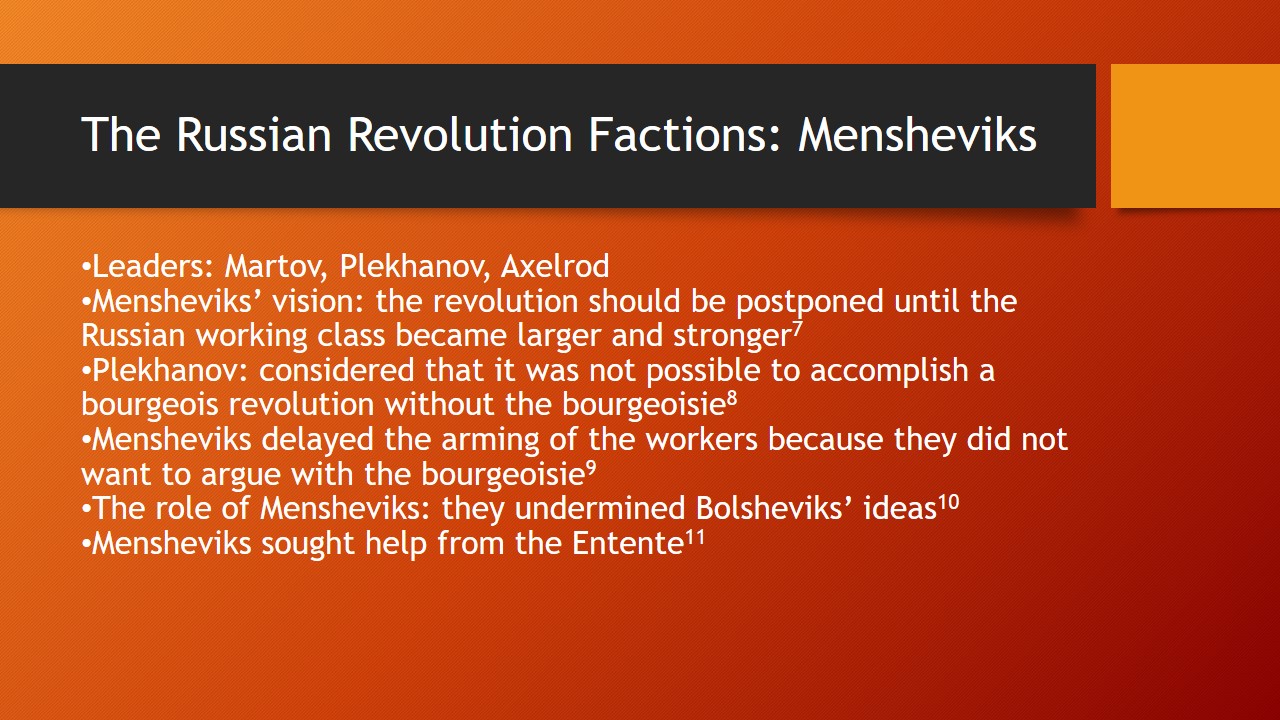
Domestic and Foreign Opposition to Revolution
- Domestic opposition: the White Army.
- The White Army opposed Bolsheviks.
- Foreign opposition: Japan, Britain, the USA.
- Capitalist countries gave military help to the White Army.
To oppose Bolsheviks, those rooting for monarchism and capitalism created the White Army. Later, the White Army received military support from several Western states. Meanwhile, Bolsheviks created the Red Army to beat the protesters. Eventually, anti-Bolshevik forces were defeated because their economic and political goals were not as attractive as those of Bolsheviks.
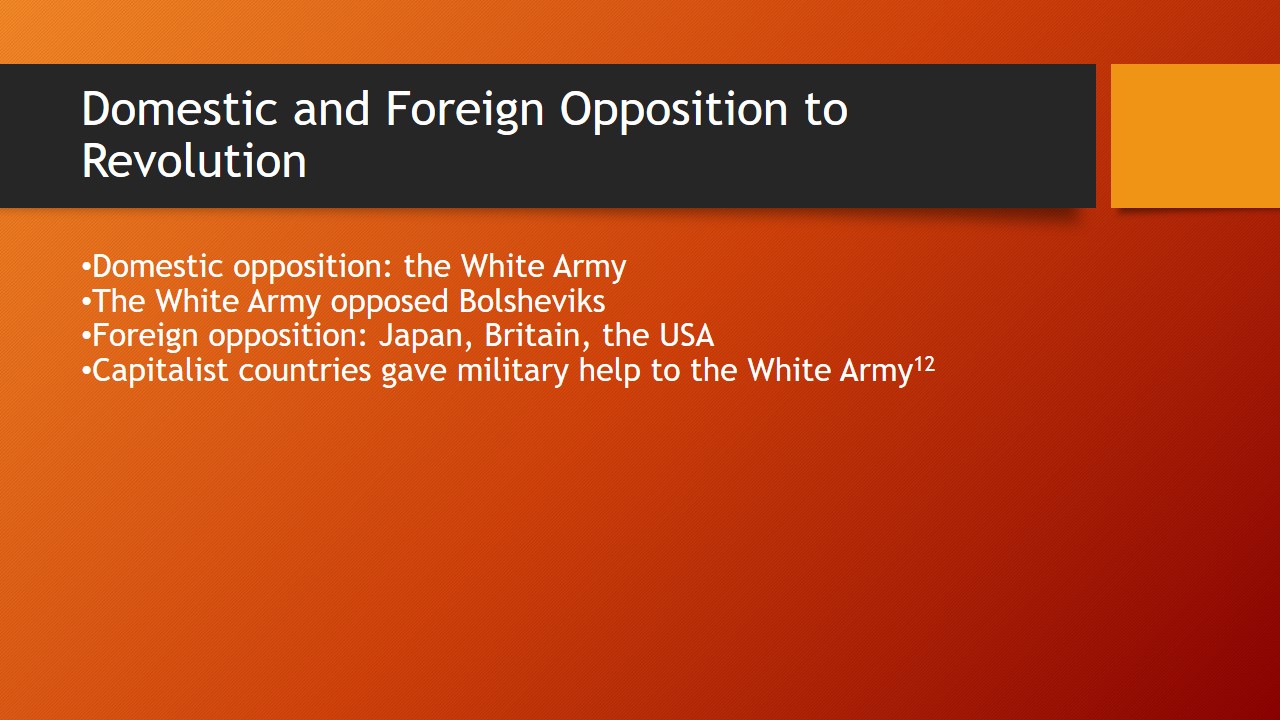
The Evaluation of the Seizure of Power by Bolsheviks
- Common opinion: the Bolsheviks were “wrong to seize power” in 1917.
- The problem: Marx’s idea of socialism was based on the efforts of industrial working classes.
- In fact: the Russian working class was not large.
- Lenin: viewed the complicated political situation as a unique opportunity.
- The majority of political groups had weak leaders.
- Bolsheviks thought that they had a realistic plan, but it was not true.
- Another dilemma: how to industrialize without capitalism.
Whereas the revolution was viewed as an exceptional opportunity to seize power and alter the country’s political and economic development, the seizure of power by Bolsheviks did not bring about the expected results. Lenin was convinced that Bolsheviks had the best-developed program and the most effective leaders. However, the major drawback of their scheme was that they were trying to arrange a socialist revolt in a principally agrarian society. Hence, although Bolsheviks managed to gain control over the country, they could not hold it for a long time.
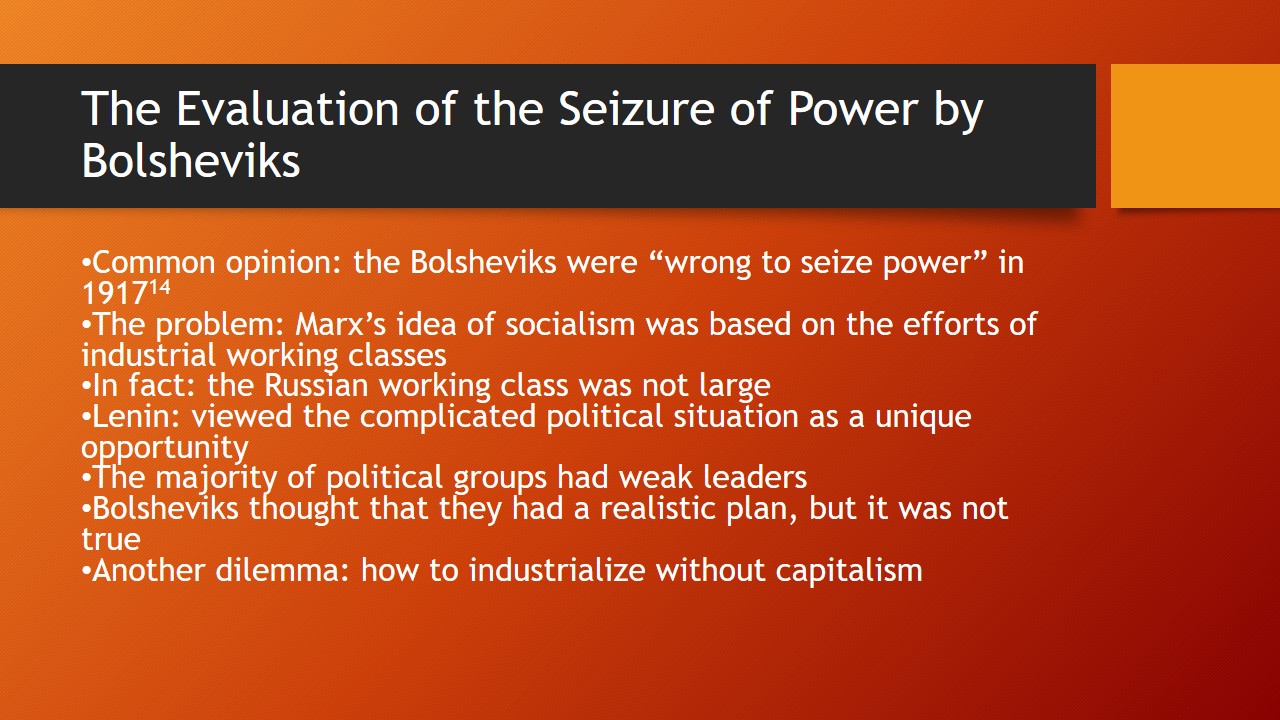
Conclusion: Changes that Occurred in Society
- No support from the majority of people.
- Expectations:
- Other socially developed countries would help Russia to industrialize;
- Industrialization would occur without harsh measures on the population;
- Reality:
- Other countries did not organize revolutions;
- Serious problems emerged in society;
- Extreme austerity measures had to be imposed on the people.
- An attempt to create a separate revolutionary government.
- Ethnic minorities started to demand independence.
- A civil war: a result of tensions between different groups of the population.
While revolutionary leaders expected immediate positive changes, the latter did not occur. The ambiguity prevailed in society since people could not understand who was at the rule and what their life would be like after the revolution. The expected support from industrialized countries did not arrive, which led to the intensification of the need to industrialize. Finally, a civil war broke out in Russia as a result of numerous tensions between people.
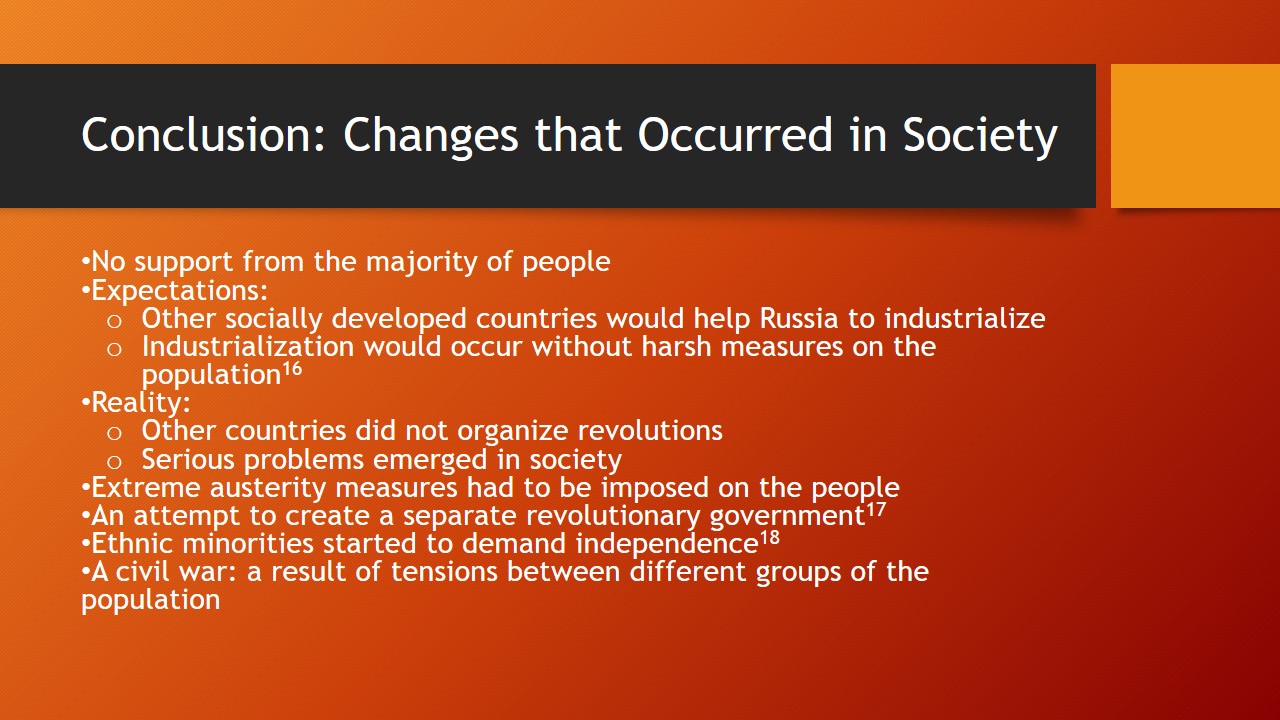
Bibliography
Bickmann, Mitchell, and Brad Seidman. “Vladimir Lenin and the Bolshevik Revolution in Russia.” Social Science Docket 7, no. 1 (2007): 41–46.
Daly, Jonathan. “Bolshevik Power and Ideas of the Common Good.” Modern Age 54, no. 1–4 (2012): 77–88.
DeFronzo, James. Revolutions and Revolutionary Movements. 5th ed. Boulder, CO: Westview Press, 2014.
Goldstone, Jack A. Revolutions: Theoretical, Comparative, and Historical Studies. 3rd ed. Belmont, CA: Cengage, 2003.
Trotsky, Leon. “The Russian Revolution.” The Saturday Evening Post 203, no. 48 (1931): 16–120.